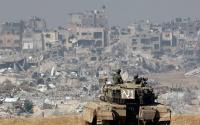28 January 2009
24 January 2009 / Press TV
Press TV: Professor Chomsky, we better start with Pakistan. The White House not commenting on the killings of people [in cross-border drone attacks from Afghanistan into Pakistan]. Richard Holbrooke, someone whom you've written about in the context of Yugoslavia, is the man [President Barack] Obama has chosen to solve the situation.
Chomsky: Well, it was pretty clear that Obama would accept the Bush doctrine that the United States can bomb Pakistan freely, and there have been many case[s] which are quite serious.
There has been for example a great deal of chaos and fighting in Bajaur province, which is a adjacent to Afghanistan and tribal leaders- others there- have traced it to the bombing of a madrassa school which killed 80 to 95 people, which I don't think was even reported in the United states, it was reported in the Pakistani press of course.
The author of the article reporting it, a well-known nuclear physicist, Pervez Hoodbhoy pointed out at the time that this kind of massacre will of course engender terror and reactions, which will even threaten the state of Pakistan. And that has been what is happening. We are now seeing more of it.
The first message of the Pakistani government to General [David] Petraeus, the American General when he took command of the region was that they did not want any more bombings in Pakistan.
Actually, the first message to the new Obama administration by President [Hamid] Karzai of Afghanistan was the same, that he wanted no more bombings. He also said that he wants a timetable for the withdrawal of the foreign troops, US and other troops, from Afghanistan. That was of course just ignored.
Press TV: And these three foreign envoys, well the third one has not been announced yet perhaps, but some people are expressing optimism about George Mitchell's position as Middle East envoy.
Richard Holbrooke, which [we] have looked at. We have talked to the former Bosnian foreign minister here, who seemed to imply that he may even have had a role in the say so for the Srebrenica massacre, and of course, Dennis Ross is being talked about as an envoy for Iran.
Chomsky: Well Holbrooke has a pretty awful record, not so much Yugoslavia, but earlier. For example, In the Indonesian atrocities in eastern Timor, where he was the official in charge, and evaded to stop the US support for them, and all together it's a very spotty record.
George Mitchell is, of the various appointments that have been made, he is the most decent let's say. He has a pretty decent record. He achieved something in Northern Ireland, but of course, in that case there was an objective.
The objective was that the British would put an end to the resort to violence in response to IRA terror and would attend to the legitimate grievances that were the source of the terror. He did manage that, Britain did pay attention to the grievances, and the terror stopped- so that was successful.
But there is no such outcome sketched in the Middle East, specially the Israel-Palestine problem. I mean, there is a solution, a straightforward solution very similar to the British one. Israel could stop its US-backed crimes in the occupied territories and then presumably the reaction to them would stop. But that's not on the agenda.
In fact, President Obama just had a press conference, which was quite interesting in that respect. He praised the parabolic peace initiative, the Saudi initiative endorsed by the Arab League, and said it had constructive elements. It called for the normalization of relation with Israel, and he called on the Arab states to proceed with those "constructive elements," namely the normalization of relations.
But that is a gross falsification of the Arab League initiative. The Arab League initiative called for accepting a two-state settlement on the international border, which has been a long-standing international consensus and said if that can be achieved then Arab states can normalize relations with Israel.
Well, Obama skipped the first part, the crucial part, the core of the resolution, because that imposes an obligation on the United States. The United States has stood alone for over thirty years in blocking this international consensus, by now it has totally isolated the US and Israel.
Europe and now a lot of other countries have accepted it. Hamas has accepted it for years, the Palestinian Authority of course, the Arab League now for many years [have accepted it]. The US and Israel block it, not just in words, but they are blocking it in actions constantly, (this is) happening every day in the occupied territories and also in the siege of Gaza and other atrocities.
So when he skips that it is purposeful. That entails that the US is not going to join the world in seeking to implement a diplomatic settlement, and if that is the case, Mitchell's mission is vacuous.
Press TV: Is there a contradiction in that George Mitchell of course did speak to members of the Sinn Féin, their military wing of course of the IRA.
At the same time, well on this channel [Press TV] we have been covering the Gaza conflict, its headquarters were bombed, and now we are being told that Israeli soldiers will not give their names, and the names of people are not being released for fear of prosecution.
And yet, some were saying that Obama did say that the border should be opened. Should we see any change in policy there?
Chomsky: He did say that, but he did not mention the fact that it was in the context of a lot other demands. And Israel will also say, sure the borders should be opened but he still refuses to speak to the elected government (i.e. Hamas), quite different from Mitchell in Northern Ireland.
It means Palestinians will have to be punished for voting in a free election, the way the US did not want them to, and he endorsed the Condoleezza Rice-Tzipi Livni agreement to close the Egyptian-Gaza order, which is quite an act of imperial arrogance.
It is not their border, and in fact, Egypt strongly objected to that. But Obama continued. He says we have to make sure that no arms are smuggled through the tunnels into the Gaza Strip. But he said nothing about the vast dispatch of far more lethal arms to Israel.
In fact, right in the middle of the Gaza attack, December 31, the Pentagon announced that it was commissioning a German ship to send 3,000 tons of war material to Israel. That did not work out, because the government of Greece prevented it but it was supposed to go through Greece but it could all go through somewhere else. This is right in the middle of the attack on Gaza.
Actually there were very little reporting, very few inquiries. The Pentagon responded in an interesting way. They said, well this material won't be used for the attack on Gaza, in fact they knew that Israel had plans to stop the attack right before the inauguration, so that Obama would not have to say anything about it.
But the Pentagon said that this material is being used for pre-positioning for US forces. In other words, this has been going for a long time, but this is extending and reinforcing the role of Israel as a US military base on the edge of the major oil producing regions of the world. If they are ever asked why they are doing it, they will say for defense or stability, but it is just a base for further aggressive action.
Press TV: Robert Gates and Admiral [Mike] Mullen have been talking about the 16-month timeline for withdrawal from Iraq is just one of the options, a slight difference from what Obama has been saying in the campaign. And, Hillary Clinton famously said she was prepared to obliterate all of Iran and kill 70 million citizens. On Iraq and Iran what do you see as changes?
Chomsky: What happened in Iraq is extremely interesting and important. The few correspondents with real experience any whom know something have understood it. Patrick Cockburn, Jonathan Steele and one or two others.
What has happened is that there was a remarkable campaign of non-violent resistance in Iraq, which compelled the United States, step-by-step, to back away from its programs and its goals. They compelled the US occupying forces to allow an election, which the US did not want and tried to evade in all sorts of ways.
Then they went on from there to force the United States to accept at least formally a status of forces agreement, which if the Obama administration lives up to it, will abandon most of the US war aims. It will eliminate the huge permanent military bases that the US has built in Iraq. It will mean the US will not control decisions over how the oil resources will be accessed and used. And in fact just every war aim is gone.
Of course there is a question of whether the US will live up to it and what you are reporting is among the serious indications that they are trying to evade living up to it. But what happened there is really significant, and a real credit to the people of Iraq, who have suffered miserably. I mean, the country has been absolutely destroyed, but they did manage to get the US to back away formally from its major war aims.
In the case of Iran, Obama's statements have not been as inflammatory as Clinton's, but they amount to pretty much the same thing. He said all options are open. Well, what does all options mean? Presumably that includes nuclear war, you know, that is an option.
There is no indication that he is willing to take the steps, say, that the American population wants. An overwhelming majority of the American population for years has been in favor, has agreed with the Non-Aligned Movement, that Iran should have the rights granted to the signers of the non-proliferation treaty, in fact to develop nuclear energy.
It should not have the right to develop nuclear weapons, and more interestingly about the same percentages, about 75 to 80%, call for the establishment of a nuclear weapons free zone in the region, which would include Iran, Israel, and any US forces deployment there, within all kinds of verifications and so on.
That could eliminate probably one of the major sources of the conflict. There is no indication that the Obama administration has any thought of doing anything about this.
Press TV: Just finally Professor Chomsky, the US economy, of course where you are -that is dominating the news and the lives all Americans and arguably the people around the world- and this 825 billion dollar package. How do you think the Obama people are going to handle this?
Chomsky: Nobody really knows. I mean, what is happening with the economy is not well understood. It is based on extremely opaque financial manipulations, which are quite hard to decode. I mean, the general process is understood, but whether the $800 billion, or probably larger government stimulus, will overcome this crisis, is not known.
The first $350 billion have already been spent- that is the so-called part bailout but that went into the pockets of banks. They were supposed to start lending freely, but they just decided not to do it. They would rather enrich themselves, restore their own capital, and take over other banks- mergers and acquisition and so on.
Whether the next stimulus will have an effect depends very much on how it is handled, whether it is monitored, so that it is used for constructive purposes. [It relies] also on factors that are just not known, like how deep this crisis is going to be.
It is a worldwide crisis and it is very serious. It is suddenly striking that the ways that Western countries are approaching the crisis is exactly the same as the model that they enforce on the Third World when there is a crisis.
So when Indonesia has a crisis, Argentina and everyone else, they are supposed to raise interest rates very high and privatize the economy, and cut down on public spending, measures like that. In the West, it is the exact opposite: lower interest rates to zero, move towards nationalization if necessary, pour money into the economy, have huge debts.
That is exactly the opposite of how the Third World is supposed to pay off its debts, and that this seems to pass without comment is remarkable. These measures for the West are ones that might get the economy moving again, while it has been a disaster for others.






